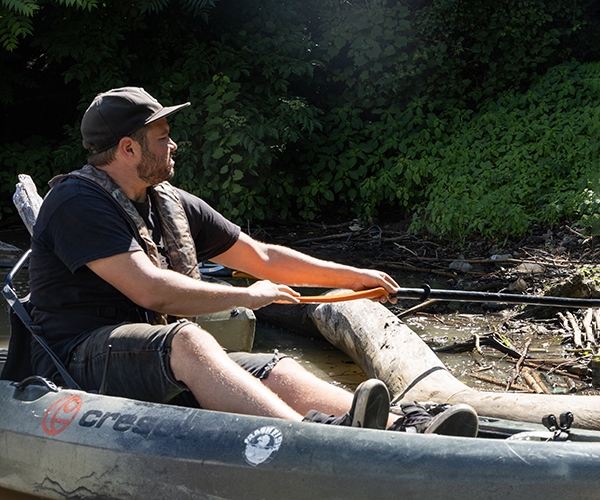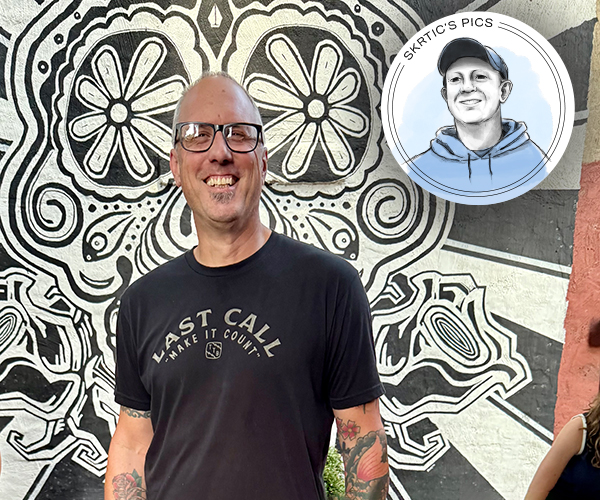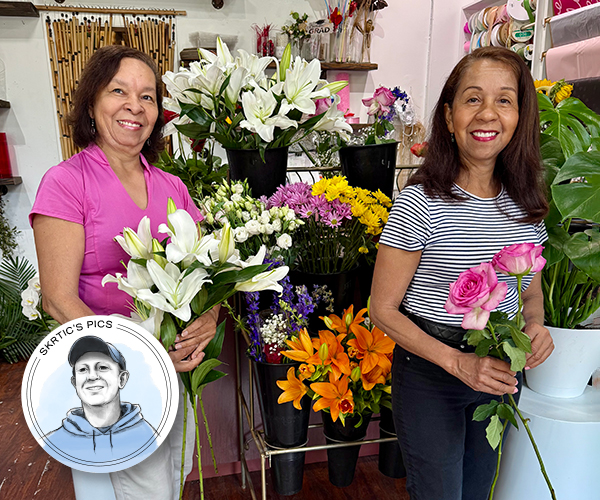Kris Pickel walks into Constantino's Market minutes after finishing her early-evening newscast, angling for the salad bar in what by all rights should be uncomfortably high black stilettos. It's just then that night manager Samira Karim rushes into her arms. "Pickel!" she exclaims, nearly knocking the lithe anchor over in her excitement.
Letting go for a second, Karim turns to me and solemnly declares her love for Channel 3's weekday evening 6 and 11 p.m. co-anchor. "Pickel is the best," she says. "I go home from work and right away I put on Channel 3. She and Russ Mitchell, they just click together. They are very warm and very friendly not like ... " finishing with a critique of another station that's somewhere deeper in your channel lineup.
"Samira, shhh," Pickel says, her face reddening. But Karim ignores the anchor's pleas, hugs her twice more and turns to another customer who has just walked into the small Warehouse District grocery spot and cafe. "This is Mrs. Pickel," she trumpets, pushing the anchor toward him like a proud merchant presenting her best wares. Then she stands back, waiting for her favorite evening newscaster to pour on the charm.
Kris Pickel excels in this kind of situation. She puts her purse down on a nearby table so she can fully focus on the customer. "Hello," she says extending her hand as her wide, bright, blue eyes lock on his. "Nice to meet you." The words sound sincere and true in her warm, lilting voice.
"Thank you," the man says, then asks after a polite pause: "And what do you do in Cleveland?"
This is the sort of situation that befalls a television newscaster plucked from California to help fill a position last held by a local legend. Channel 3 brought Kris Pickel to town for the evening news last April after the station and its longtime solo evening anchor, Romona Robinson, couldn't come to terms on a new contract.
Robinson had been at Channel 3 for 15 years, but in 2012 she left and took a co-anchor position at rival 19 Action News. Pickel admits competing against Robinson initially worried her. Even armed with three Emmys and an Edward R. Murrow award, she understood the challenges of being an unknown face. Station president and general manager Brooke Spectorsky did as well, but he liked Pickel's versatility.
"I wanted an anchor who could go into the city and report on events," he says. "I wasn't looking for someone who would just sit in the studio chair and read a teleprompter."
Pickel shares the anchor desk with Russ Mitchell — most recently CBS' national weekend anchor and a hard-news veteran who also serves as managing editor of Channel 3's evening news operation. Spectorsky thought they would mesh, and the two first met about a week before they went on the air together last April.
Behind Pickel's California good looks is a dogged reporter who has won awards for stories about a police department's excessive use of force in Tucson, Ariz., and in-depth reporting on the zodiac murder cases in California.
"Kris is a news person," says Morgan Loew, a reporter who worked with her in Tucson. "She's relentless in her research and has this great ability to cut through BS."
But Pickel's greatest gift may be her ability to make others comfortable. "We'll do interviews, and I'll just watch her sometimes," says Mitchell. "I've [worked] with some of the best interviewers in the world, and Kris has the same sort of touch."
When Pickel tilts her head to the left and looks at you, something happens. One senses a deep well of empathy in her — a result of not only her news training but also her own pain and trials.
"I relate to people's losses," she says. "I can understand some people's horror when they see a news truck show up. But I also know that it can be cathartic, telling the world what a wonderful person the world has lost. I never focus on death. I like to give people the opportunity to talk about life."
Born the youngest of three sisters in a close-knit Sacramento, Calif., family, Pickel didn't grow up wanting to become a news anchor. But as a senior at UC Davis majoring in organizational communications, she was required to do an internship and found one working in community relations at KCRA, a television station in her hometown.
Her TV experience might have ended there, if not for the fact that her cubicle sat across from the men's bathroom. "That was probably one of the biggest breaks of my life," Pickel laughs. "People would stop by and talk to me on their way back to their desks."
One of those people was Deke Monegan, the director of the station's editing department. Monegan taught Pickel the basics of visual storytelling. She learned the rest from hanging out with the newsroom staff. "There was just this huge sense of camaraderie in the newsroom," Pickel recalls. "We'd go out drinking after work. We'd have a cocktail, and I would just listen to their days."
Pickel says she was at first intimidated by the newsroom and asked many questions. The managing editor noticed and started leaving her notes of advice. "Never forget that news can be used as a public service," he'd write one day. The next: "You haven't really been in the business until you've been fired at least once."
When Pickel graduated college in 1991, she had two job offers: She could go to San Francisco for a $45,000-a-year sales job that came with a car or she could work as a television news video editor for $18,000 a year at KCRA. She went with the news job.
"Once I fell in love with the news, it was sort of a natural progression from picture storytelling to giving people a voice to tell their own stories," she says.
After a year at the station, her co-workers convinced her she should look into reporting. Soon she took a job offer in Grand Junction, Colo., a popular retirement spot in western Colorado. The news was bittersweet for her family.
"Our father told us we could go anywhere we wanted to go to college — as long as it wasn't more than 20 minutes away from home," Pickel's sister Sandy Barger jokes. "It was traumatic when Kris told us she was going to Colorado."
Pickel assured her family the line of work would lead her back to Sacramento. After nine months in Colorado, she got a reporting job in Reno, Nev. There, Pickel worked 12-hour days, engrossing herself in the lives of her subjects. Getting the story right became a driving force. "This might be the only time their name was ever in the news," she says. "One of my biggest fears was for them to turn on the TV and say, •That's not right. That's not who I am.' "
Three months after her move to Reno, she rented an apartment with two other newsroom employees. One of them was Carl Lemon, a fun-loving cameraman whose creative camera work was inspired by his obsession with comic books. The two instantly clicked.
"We just had so much fun together," Pickel says. They worked well as a team ("Visually, he taught me new ways of telling stories") and as confidantes ("I called him for advice on everything"). But it took Lemon moving away and a year to elapse for her to realize they should be together.
"I was on the phone, and when I hung up, my boyfriend asked: •Was that Carl?' I said, •yes.' And he said, •I can always tell when you're talking to Carl. You just light up more.' "
She and Lemon started dating soon after and were engaged within a few months. They got married three years later in Tucson, where Pickel was working a weekday anchor job at the time. Their wedding cake had figurines of a pickle and a lemon. For wedding gifts, viewers sent the couple recipes for pickled lemons and sour pickles.
The best way to describe the decor of Kris Pickel's Avon Lake household is "superhero friendly." There are framed prints of comic characters throughout the house and the hallways have Superman night-lights.
In the living room, the couple's two boys, Clark and Bruce, named after Superman and Batman's alter egos. ("I am pretty much the best wife ever for agreeing to that," she says with a laugh) are lounging on the couch with their parents. Pickel suggests they pop in a video of their move to Cleveland, and within seconds it becomes apparent that this is not your standard family video. It is a masterpiece.
Where other families bond by playing board games, Pickel's family creates films, written and produced by her husband. Most of the videos are spoofs of popular movies, and Pickel has been cast as both Princess Leia and an Indiana Jones nemesis. Everyone in the family agrees that she is by far the worst actress of any of them.
These moments are precious to the family. They know, perhaps more than most, the slipperiness of minutes and the importance of togetherness.
In 2006, the family moved from Tucson to Sacramento, fulfilling the promise to return home Pickel made to her family 15 years earlier. She took a job as a weekday anchor and reporter that quickly transitioned to solely weekend shifts. But she was thrilled to be home, sharing dinners and everyday moments with the whole family.
Life seemed to have fallen into place. Then, one day in 2007, everything suddenly changed again. When Clark was 4 years old, he walked into his mother's bedroom and told her his leg hurt.
The doctor initially wasn't concerned: He figured the boy had bumped it. It should be fine after a few days, he said. But a few days later, Clark woke up screaming in pain and was rushed to the emergency room. After tests and X-rays, the doctor ushered Pickel into a side room. He told her it was cancer.
"I was absolutely devastated," she says. Pickel knew the gravity of those words from personal experience. In her early 20s, she'd watched helplessly as her best friend Monica had gone through chemotherapy, eventually succumbing to leukemia.
"Monica was the closest thing I could have to another family member," she says. "I always thought she was going to get better. [After she died] I regularly had nightmares about not being able to save people I love."
Pickel tried to block these thoughts as doctors admitted Clark to the oncology ward, where she essentially moved into his room for a week. After a litany of tests, the doctors came back with a new diagnosis. They believed Clark did not have cancer, but a rare autoimmune disease called Langerhans cell histiocytosis that was attacking a bone in his hip. The odds of surviving the disease were greater than surviving cancer, but treatment still involved chemotherapy. "We had to pump poison into my baby in order to save him," Pickel says, her eyes swelling with tears recalling the memory.
During treatment, she would read and reread the story of Louis Pasteur, the inventor of the rabies vaccine, to Clark. "I'd tell Clark this is kind of what you're going through," Pickel says. "Doctors are injecting this army into your body to fight an invisible army."
When Clark was done with chemotherapy in the summer of 2007, the family celebrated. Then, three months later during a follow-up appointment, another tumor was found in his arm, and he had to go through another round of treatment.
Clark is now 10 years old and the family is counting down the days until he hits puberty, when Pickel says doctors believe his change in body chemistry will dramatically reduce the chance of the tumor ever coming back. "Every time we see a pimple we cheer," she says.
After six years in California, Pickel began to tire of the long weekend hours spent away from her family. "When I took a day off, it was like Christmas for the boys. They'd jump around the house screaming, •Yay it's family day. We all get to be together!' It was not right," she says.
Recognizing that things weren't going to change, Pickel's agent put out feelers in 2011, looking for stations with more family-friendly hours. That's when Channel 3 called. "At first, I said no way," Pickel recalls. It was too far away from her parents and sisters. But her agent persuaded her to at least fly out for an interview.
So that November, Pickel caught a red-eye flight and arrived in Cleveland wearing the remnants of her last broadcast's makeup. After living in California neighborhoods with high fences, she was amazed at the friendliness of the people she talked to during her interview. "People here are more interested in each other," she says. "They talk to their neighbors more."
Hours after her interview ended, Pickel remembers calling her agent: "If they make an offer, I'm coming to Cleveland."
She was offered the job about a month later. It was only then that she learned Russ Mitchell was going to be her co-anchor. "He called me after I was hired, and I was like, Oh my god, that's Russ Mitchell on the other end of the line," Pickel recalls.
She made her Cleveland debut last April, and any fears about a lack of chemistry between the two anchors dissipated within a few days. "I think the point when I really knew this was going to work was on opening day last year," Mitchell recalls. "We were on air for two or three hours. Some of the stuff is scripted, but a lot of stuff is unscripted. In those situations, you really have to connect."
Since then, Pickel and Mitchell have held strong in their 6 p.m. newscast, coming in second in the 25-to-54 demographic in February. But with poor-performing network programming at 10 p.m., the 11 p.m. newscast has slipped to third place, behind 19 Action News and NewsChannel 5, according to the latest Nielsen ratings.
"I'm not worried," Spectorsky says. "These things take time. My goal for the year is for people to get to know who Kris is."
Mitchell is less Zen about the numbers: "If someone's keeping score, I want to win," he says.
Last summer, Channel 3 unveiled a new motto: "See the Possible." The station's goal is to help shine a light on the good things happening here and help combat self-defeating stereotypes some people hold about the city. Being new here, Pickel is a natural to help Clevelanders do that. "There are so many positives," she says. "But it can be hard to see them unless someone points them out."
In the past year, the job has taken a lot of different forms. She's rappelled down the new DoubleTree hotel for a charity event, went diving with the sharks at the Greater Cleveland Aquarium and assembled statistics showing the safety of downtown after Forbes named Cleveland one of the nation's most dangerous cities.
After all Pickel's been through, she understands more than most that optimism is not something that always comes easily. "But I do choose to look for the positives," she says. "It's a conscious choice I make every day."



